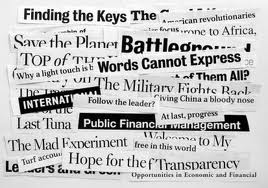Two headlines in the Business Report caught my eye this morning. The first had to do with China’s economic performance. Later today I am flying to Guangzhou, China for a day’s work with London Business School on the Nestle Leadership Programme. Given TomorrowToday’s extensive work in China and the region, articles on that part of the world always feature prominently on the radar. And so they should for all leaders serious about a global context and the big picture as the 21st Century will certainly become known as the ‘Chinese century’.
The headline was, ‘Chinese economic growth speeds up’ (by Kevin Yao and Aileen Wang) and it stated: ‘Evidence of a burgeoning recovery in exports, stronger than-expected industrial output and retail sales, together with robust fixed asset investment, all signalled that Beijing’s pro-growth policy mix has gained sufficient traction to underpin a revival without igniting inflationary risks yet’. The challenge China’s leaders face in the face of an economy that is growing as fast as it is will be to ensure economic, political and social stability. This is a view shared by Chris McNally, a political economist and global authority on China. China’s leaders are steering towards a number of economic reforms designed to address various imbalances that exist; imbalances that if not addressed, could lead to social upheaval in the future. China is entering the global economy at its own pace and in its own way and the sheer size and momentum of it economic engine mean that the Western economies cannot afford to ignore what is happening in this part of the world. The Chinese economy depends on a healthy global economy but so too is the global economy dependent on a healthy Chinese economy.
Of course the key to doing business in China is to have a good liver! The social aspect is integral to doing business in China. Most in the West approach business primarily from a contractual point of view but the Chinese regard relationship as equally important. It is referred to as ‘Guanxi capitalism’ and you ignore the relational aspect at your peril in forging economic ties with China.
Bottom line: As a leader you need to keep you eye on what is happening in China. One way or the other China will impact your industry, market and playing field.
 The second headline that caught my attention was, ‘Ethical investors look to shun shares of companies that dodge tax’ (by Tom Bergin and Sinead Cruise). They use a term, ‘ethical investors’ that has been part of our TomorrowToday lexicon for some time. We have been warning companies about the increasing rise in ethical consumers and that in the future, your company’s stance on the green issues, on ethical issues and the like, will play a key role in the decision-making process when it comes to buying your product or engaging your service. There are a growing number of investors (and consumers) that are exercising a more socially responsible approach and mandate when it comes to considering what it is you have to offer.
The second headline that caught my attention was, ‘Ethical investors look to shun shares of companies that dodge tax’ (by Tom Bergin and Sinead Cruise). They use a term, ‘ethical investors’ that has been part of our TomorrowToday lexicon for some time. We have been warning companies about the increasing rise in ethical consumers and that in the future, your company’s stance on the green issues, on ethical issues and the like, will play a key role in the decision-making process when it comes to buying your product or engaging your service. There are a growing number of investors (and consumers) that are exercising a more socially responsible approach and mandate when it comes to considering what it is you have to offer.
The article reveals that the FTSE Group, which compiles the share indices that fund managers use to build investment portfolios, is looking into excluding companies with what it calls ‘overly aggressive tax reduction policies’ from its ethical index group, FTSE4Good. This type of thinking will only gain momentum and in part, it is driven by a generational approach that is markedly different from that which we have become used too in the past.
Bottom line: As a leader you ignore this at your peril. It is important and will becomes increasingly so with the passage of time.
But now it is time to pack for China. I look forward to further lessons that will no doubt emerge from simply being in this part of the world. During my last visit there was extensive building activity in the city – I look forward to see what progress has been made: I suspect it will be nothing short of remarkable!


